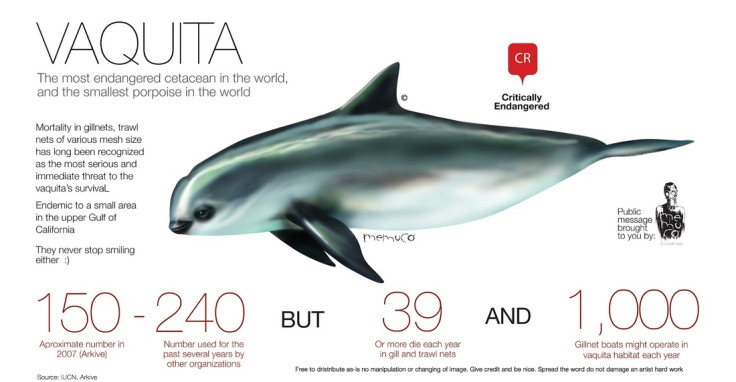Last ditch attempt announced to save vaquita porpoises from humans' 'acquatic cocaine' habit
There are less than 60 vaquita porpoises left in the wild and it may be difficult to catch any to protect them.
Some of the last remaining vaquita porpoises are to be taken into protection in a last-ditch attempt by the Mexican government to save the species from extinction. The vaquita population has been falling due to the effects of overfishing another endangered species, the totoaba fish. The fish is hunted for its bladder, which is popular in Chinese cuisine.
The totoaba's swim bladder, which it uses to to regulate buoyancy, is sometimes known as "aquatic cocaine" due to the enormous sums of money it sells for on the black market in Hong Kong and China. Each swim bladder, or totoaba maw, can fetch thousands of dollars.
Vaquita porpoises are frequently caught in the gillnets that are laid down for totoaba, which has led to a population decline. There are thought to be fewer than 60 vaquita porpoises left in the wild, down from more than 550 in 1997. The vaquita is now the world's most endangered marine mammal.
"We are watching this precious native species disappear before our eyes," said Rafael Pacchiano, Mexico's secretary of the environment and natural resources.
"This critical rescue effort is a priority for the Mexican government and we are dedicated to providing the necessary resources in order to give the plan its best chance of success."
The plan to move a substantial number of the remaining wild vaquita porpoises into a sanctuary in the northern Gulf of California is an ambitious plan – called VaquitaCPR – which is to be led by the Mexican government and a group of conservation organisations. Vaquita porpoises are notoriously shy, and the group foresees difficulties in its mission.

"Catching and caring for vaquitas may prove impossible, but unless we try, the species will likely vanish," reads an online statement from the National Marine Mammal Foundation, which is collaborating on the VaquitaCPR project. Sam Ridgway, president of the foundation, said: "We recognise that the odds are stacked against us, but the conservation and scientific communities feel a duty to act and we hope our collective expertise can make a difference."
Last year the Environmental Investigation Agency released a report on the dual threat to the totoaba and the vaquita porpoise, concluding that the extinctions are inevitable for as long as the trade in totoaba swim bladder persists.
© Copyright IBTimes 2025. All rights reserved.






















